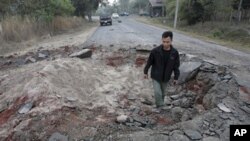An international anti-cluster bomb group has confirmed the use of the munitions by Thailand during border clashes with Cambodia in February.
The Cluster Munition Coalition said it had investigated sites inside Cambodia where the munitions fell near Preah Vihear temple and found unexploded submunitions and fragments.
At least two people were killed when they handled an unexploded bomblet that detonated and seven others have been injured in explosions, the group said in a statement.
The Coalition called on Cambodia and Thailand to prohibit the use of cluster bombs, which are scattered over a wide area and sometimes fail to detonate, leaving behind dangerous remnants.
Neither Cambodia nor Thailand are party to an international ban on such weapons.
“It’s appalling that any country would resort to using cluster munitions after the international community banned them,” Laura Cheeseman, director of the CMC, said in a statement. “Thailand has been a leader in the global ban on antipersonnel mines, and it is unconscionable that it used banned weapons that indiscriminately kill and injure civilians in a similar manner.”
The CMC said Thailand’s ambassador to the UN in Geneva confirmed the use of the cluster munitions in 155-mm artillery shells fired during deadly border fighting in February.
Thani Thongphakdi, a spokesman for the Thai Foreign Ministsry, told VOA Khmer Thursday the Thais had fired in “self defense” after Cambodia attacked with multiple rocket launchers.
“Both sides lost civilian property,” he said. “Cambodia’s BM21 multiple rocket launchers are very danger to Thai civilians. We had aimed at military targets, but not civilian targets.”
However, observers say civilians are now endangered by the munitions.
“There are around 5,000 people living in Sen Chey village that are at risk from these unexploded weapons,” Atle Karlsen of Norwegian People’s Aid said in CMC statement. “Thailand must supply information to help clear affected areas and make them safe for civilians to return home.”
Sao Cheth, who commands 30 Cambodian soldiers at Phnom Trop near the temple and was injured above the eye in February’s clashes, said he supported the group’s stance against the weapons.
“The condemnation is a right and fair thing, because the world has banned the use of cluster munitions,” he said.
Prak Phy, head of Samdech Hun Sen Natural Village, said residents there had suffered damage to their houses, property and rice fields, but no one has so far been injured by ordnance.
“I demand Thailand to be responsible for firing the cluster munitions in Cambodia, and I want Thailand to stop firing cluster munitions in Cambodia,” he said.
Authorities have explained to villagers not to touch unexploded munitions in the area, while the Cambodian Mine Action Center has set up warning signs around the dangerous areas, he said.




